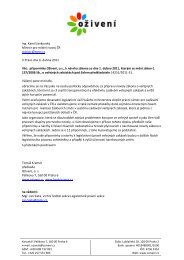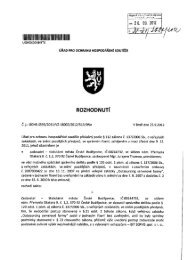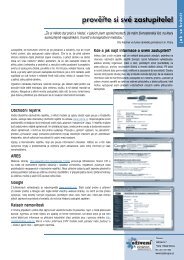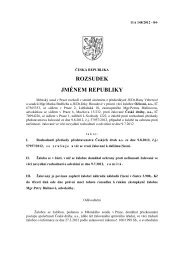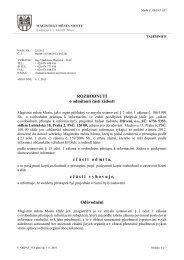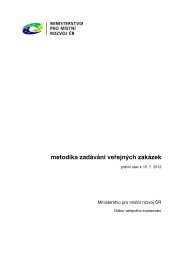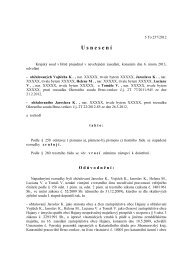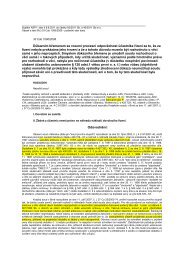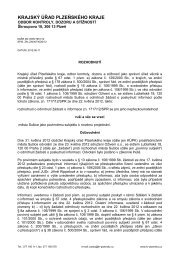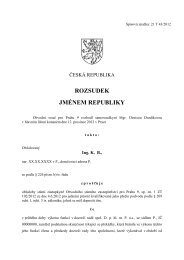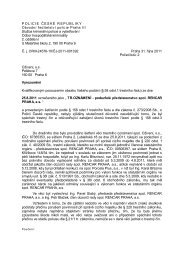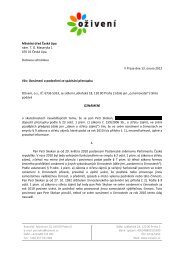- Page 4 and 5:
Publications of the ADB/OECD Anti-C
- Page 6 and 7:
iv Managing Conflict of InterestMan
- Page 9 and 10:
ForewordThe Asian Development Bank
- Page 11 and 12:
AcknowledgmentsThe Asian Developmen
- Page 13 and 14:
AbbreviationsACFEADBAPSCEOCFOCOICRP
- Page 15 and 16:
Executive SummaryThere is growing c
- Page 17 and 18:
Executive Summary xvThe Organisatio
- Page 19 and 20:
Executive Summary xviiThe People’
- Page 21 and 22:
Keynote AddressesADB/OECD Anti-Corr
- Page 23 and 24:
Keynote Addresses xxiI, therefore,
- Page 25 and 26:
Keynote Addresses xxiiiConvention A
- Page 27 and 28:
Welcome RemarksTaufiequrachman Ruki
- Page 29 and 30:
Welcome RemarksArjun ThapanDirector
- Page 31 and 32:
Keynote Addresses xxixIt is also he
- Page 33 and 34:
Remarks at the Opening DinnerH. E.
- Page 35 and 36:
Keynote Addresses xxxiiibe struck b
- Page 37 and 38:
Keynote Addresses xxxvthe best huma
- Page 39 and 40:
Closing RemarksHidayat Nur WahidCha
- Page 41:
Keynote Addresses xxxixeasier than
- Page 45 and 46:
Chapter 1Defining conflict ofintere
- Page 47 and 48:
The United Nations Convention Again
- Page 49 and 50:
Defining Conflict of Interest 7•
- Page 51 and 52:
Defining Conflict of Interest 9Conc
- Page 53 and 54:
Defining Conflict of Interest 11dut
- Page 55 and 56:
Defining Conflict of Interest 13Cou
- Page 57 and 58:
Defining Conflict of Interest 15Pol
- Page 59 and 60:
Defining Conflict of Interest 17Con
- Page 61 and 62:
Defining Conflict of Interest 19A C
- Page 63 and 64:
Defining Conflict of Interest 21Gov
- Page 65 and 66:
Defining Conflict of Interest 23•
- Page 67 and 68:
Defining Conflict of Interest 25to
- Page 69 and 70:
Defining Conflict of Interest 27abu
- Page 71 and 72:
Defining Conflict of Interest 29by
- Page 73 and 74:
Defining Conflict of Interest 31Pet
- Page 75 and 76:
Defining Conflict of Interest 33sai
- Page 77 and 78:
Defining Conflict of Interest 35of
- Page 79 and 80:
Defining Conflict of Interest 37Est
- Page 81 and 82:
Defining Conflict of Interest 391,5
- Page 83 and 84:
Defining Conflict of Interest 41Tab
- Page 85:
Defining Conflict of Interest 43to
- Page 88 and 89:
46 Managing Conflict of Interestand
- Page 90 and 91:
48 Managing Conflict of Interestref
- Page 92 and 93:
50 Managing Conflict of InterestImp
- Page 94 and 95:
52 Managing Conflict of Interestof
- Page 96 and 97:
54 Managing Conflict of InterestThe
- Page 98 and 99:
56 Managing Conflict of Interest•
- Page 100 and 101:
58 Managing Conflict of Interestpub
- Page 102 and 103:
60 Managing Conflict of Interestwor
- Page 104 and 105:
62 Managing Conflict of InterestRes
- Page 106 and 107:
Asset declaration in the Philippine
- Page 108 and 109:
66 Managing Conflict of InterestImp
- Page 110 and 111:
68 Managing Conflict of Interestwit
- Page 112 and 113:
70 Managing Conflict of Interestthe
- Page 114 and 115:
72 Managing Conflict of InterestSum
- Page 116 and 117:
74 Managing Conflict of InterestAnn
- Page 118 and 119:
Conflict of interest in Indonesia:
- Page 120 and 121: 78 Managing Conflict of Interestthe
- Page 123: Section 2:Implementation andEnforce
- Page 126 and 127: 84 Managing Conflict of Interestimp
- Page 128 and 129: 86 Managing Conflict of InterestAs
- Page 130 and 131: 88 Managing Conflict of InterestSan
- Page 132 and 133: 90 Managing Conflict of Interestare
- Page 134 and 135: Private gain from public loss:How T
- Page 136 and 137: 94 Managing Conflict of Interestor
- Page 138 and 139: 96 Managing Conflict of Interesthav
- Page 140 and 141: 98 Managing Conflict of Interestthi
- Page 142 and 143: 100 Managing Conflict of Interestfo
- Page 144 and 145: 102 Managing Conflict of InterestWh
- Page 146 and 147: 104 Managing Conflict of Interest
- Page 148 and 149: 106 Managing Conflict of InterestAn
- Page 150 and 151: 108 Managing Conflict of InterestSe
- Page 152 and 153: 110 Managing Conflict of Interest(5
- Page 154 and 155: 112 Managing Conflict of Interest(2
- Page 156 and 157: 114 Managing Conflict of InterestSe
- Page 158 and 159: 116 Managing Conflict of InterestNB
- Page 160 and 161: 118 Managing Conflict of InterestA
- Page 162 and 163: 120 Managing Conflict of Interestho
- Page 164 and 165: 122 Managing Conflict of Interestor
- Page 166 and 167: 124 Managing Conflict of Interestin
- Page 168 and 169: 126 Managing Conflict of InterestFr
- Page 172 and 173: 130 Managing Conflict of InterestMo
- Page 174 and 175: 132 Managing Conflict of InterestFi
- Page 176 and 177: 134 Managing Conflict of InterestFi
- Page 179: Section 3:Prevention andEnforcement
- Page 182 and 183: Codes of conduct and mechanisms top
- Page 184 and 185: 142 Managing Conflict of Interestof
- Page 186 and 187: 144 Managing Conflict of Interestha
- Page 188 and 189: 146 Managing Conflict of Interestfa
- Page 190 and 191: Preventing conflicts of interest in
- Page 192 and 193: 150 Managing Conflict of Interestwo
- Page 194 and 195: 152 Managing Conflict of Interestac
- Page 196 and 197: 154 Managing Conflict of InterestAg
- Page 198 and 199: 156 Managing Conflict of Interestha
- Page 200 and 201: 158 Managing Conflict of Interest
- Page 203 and 204: Chapter 5Codes of conduct in thepri
- Page 205 and 206: Good corporate governance: Essentia
- Page 207 and 208: Codes of Conduct in the Private Sec
- Page 209 and 210: Codes of Conduct in the Private Sec
- Page 211 and 212: Codes of Conduct in the Private Sec
- Page 213 and 214: Codes of Conduct in the Private Sec
- Page 215 and 216: Codes of Conduct in the Private Sec
- Page 217 and 218: Compliance enforcement in a multina
- Page 219 and 220: Living business ethics: Good govern
- Page 221:
Codes of Conduct in the Private Sec
- Page 225 and 226:
Appendix 1: Seminar agendaADB/OECD
- Page 227 and 228:
Appendix 185The experience of asset
- Page 229 and 230:
Appendix 187Detecting conflict of i
- Page 231 and 232:
Appendix 2: List of participantsMem
- Page 233 and 234:
Appendix 191Asad Ali SHAHPartner, D
- Page 235 and 236:
Appendix 193WaluyoDeputy of Prevent
- Page 237 and 238:
Appendix 195PALAUSecilil ELDEBECHEL
- Page 239 and 240:
Appendix 197Sandie HITOJOSenior Con
- Page 241 and 242:
Appendix 199TRANSPARENCY INTERNATIO
- Page 243 and 244:
Appendix 201Arie SISWANTOAssistant
- Page 245:
Secretariat 203ADB/OECD Anti-Corrup



